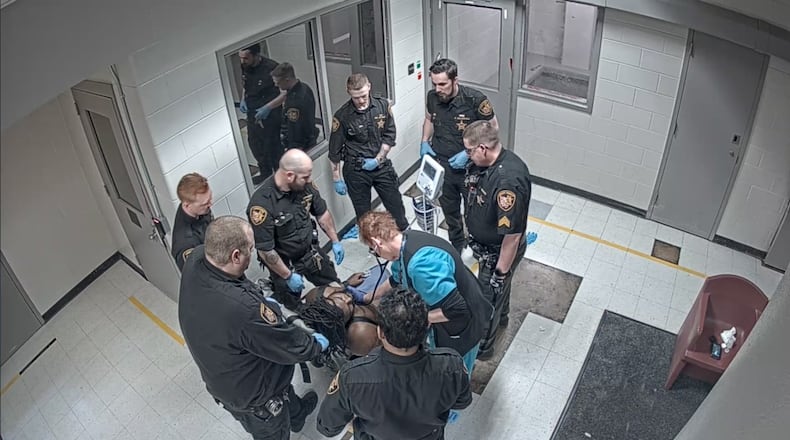The policy applies not just to jail video but to cruiser cam or body cam or other videos maintained by the sheriff’s office. It’s permitted under a law that went into effect this year, allowing law enforcement agencies to charge for video provided in response to a public records request.
Law enforcement agencies say these new policies help recoup costs after an influx of requests for video, many of which are from content creators who use the records for monetary gain.
“When someone requests a video, it’s handled on a first-come, first-served basis,” said Montgomery County Sheriff’s Office Chief of Staff Jeremy Roy. “If the new rate structure discourages large-volume requests from out of state, it actually helps Montgomery County residents by shortening the line and improving response times.”
The new policy charges $75 per hour of staff time it takes to produce a video in response to a public records request. The sheriff’s office estimates it takes up to 2.75 hours for every half hour of video, meaning each hour of produced video could cost up to $412.50. State law caps the amount an agency can charge for one video request to $750.
Jail videos routinely involve multiple cameras and can include hours of footage. Black died after two altercations with corrections officers that occurred hours apart.
”To the vulnerable population in this community, $750 is a lot of money. And generally, there’s a lot of data, there’s a lot of video, there’s a lot of footage that’s associated with these cases that we’re dealing with,” said Dayton attorney Robert Gresham, whose law office represented Black’s family.
Gresham said many Dayton residents would be unable to pay for the price tag associated with this lengthy of a video request.
“This may cost something to produce. But why make it prohibitive?” Gresham said.
The law allowing law enforcement agencies to charge for videos was tucked into House Bill 315, legislation making changes to laws governing townships, and passed in December amid a busy lame duck session with no public hearings or debate. Gov. Mike DeWine signed the bill into law in January.
A state or local law enforcement agency may include in its public records policy “the requirement that a requester pay the estimated actual cost before beginning the process of preparing a video record for inspection or production,” an analysis of H.B. 315 states.
The agency can charge for the “actual cost” of producing the video records, up to $75 per hour with a cap of $750 per request.
The Montgomery County Sheriff’s Office updated its video records policy in recent weeks to adopt these video fees.
The time to review and redact video footage is typically twice as long as the actual length of the video, Roy said.
For 30 minutes of body-worn camera video, the sheriff’s office requires 30 minutes of time for the initial review of the footage. But after that initial run-thorough of the video, the following steps and time estimates were provided by the sheriff’s office:
- 45-90 minutes for redactions
- 30 minutes for the final review of footage
- 10-15 minutes for locating, loading, saving and downloading the video
- And finally, a legal review of the video may also be implemented.
Roy said the sheriff’s office has two clerks and one sergeant who handle all of its public records requests. The office added a second clerk to the effort this year because it was so inundated with requests.
Since June 2024, the office has received more than 700 requests for body-worn camera video. Just six people accounted for 562 of those requests. Roy said the bulk of these requesters live out of state and have their own social media accounts they use to upload video content.
Roy said most members of the public will be expected to pay for video requests before the public records team begins processing them, but every request is reviewed to determine if victims are involved in the footage. Victims are not charged for videos related to their incidents.
And once fees are paid and the video is produced, residents making identical video requests about an incident won’t be charged, as law enforcement agencies are only permitted to charge for “actual costs,” Roy said.
The Montgomery County Jail Coalition, a grassroots group of community members who have advocated for community oversight at the county jail, said charging for video requests discourages transparency.
“Laws like this only provide barriers for justice and to place a priority not on public safety, but on making it harder for those seeking justice to find it. The negative impact will surely be felt by those who have suffered injustice at the hands of law enforcement. Another example of those elected to serve the public, serving self-interest instead,” the coalition said in a statement shared with this news outlet.
Gresham agreed.
“The absolute goal is to chill the ability of the public to get information when it comes to law enforcement and police violence, plain and simple. They want to restrict that access and make it as difficult as possible,” he said.
About the Author

